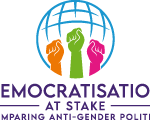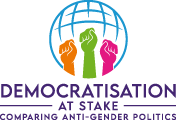
Essay: “A Decade of Dichotomy: Understanding Turkey’s Changing Stance on the Istanbul Convention for Combating Violence against Women”
September 9, 2025
Kickoff-Meeting of the Action CA23149 (January 2025)
September 18, 2025Gergorić, Maja, and Tanja Vuckovic Juros. 2025. ‘A new wave of anti-gender mobilizations in Croatia: targeting abortion and trans rights.’ European Journal of Politics and Gender (published online ahead of print 2025). https://doi.org/10.1332/25151088Y2025D000000107
ABSTRACT
Anti-gender mobilizations in Croatia resemble campaigns against gender and sexual equality seen across Europe, with some emerging as early as 2004, though most after 2012 (Paternotte and Kuhar, 2017). Anti-gender actors across borders share tropes like ‘the protection of children and family’ or ‘gender ideology’ to mobilize the general public and attract allies against similar targets, employing such tactics as petitions, referendums and protests (Paternotte and Kuhar, 2017). Nonetheless, Croatian mobilizations stand out due to their continuity and the enduring influence of conservative civil society actors.
Croatia experienced a series of anti-gender campaigns, linked together by a core group of activists progressively expanding their repertoire of contention. This progressive expansion, we argue, demonstrates an adaptability of strategies that is the key feature of the anti-gender activists’ attempt to change (back) the gender and sexuality social order. This adaptability may pass unnoticed in cases where anti-gender mobilizations remained limited or targeted a single issue or were taken over by far-right actors who bandwagoned anti-gender causes. In the Croatian case, however, the connections between different campaigns can be identified to demonstrate the adaptability of anti-gender strategies, as we show by focusing on the newest wave of anti-abortion and anti-trans mobilizations.
We proceed by sketching the rise of the Croatian anti-gender movement to situate the resurrection of abortion as a political issue in 2014 and the emergence of anti-trans activism in 2022. Though seemingly different, these mobilizations are linked together by the core anti-gender group, which brings its know-how to different political and civil society actors. It also creates bridges between audiences of different mobilizations, thus affecting a wider radicalization around gender and sexuality.

